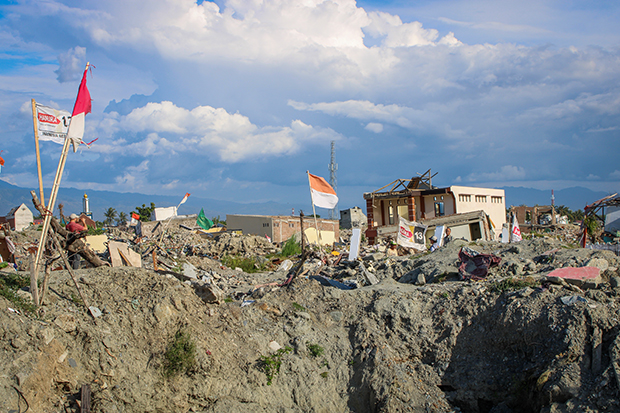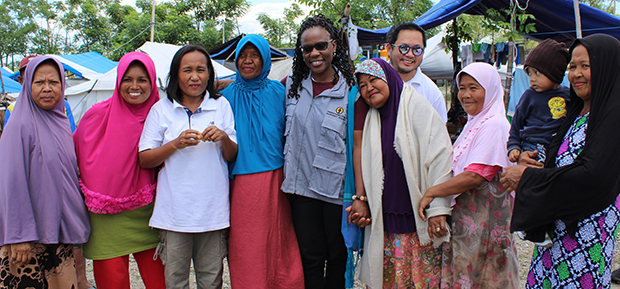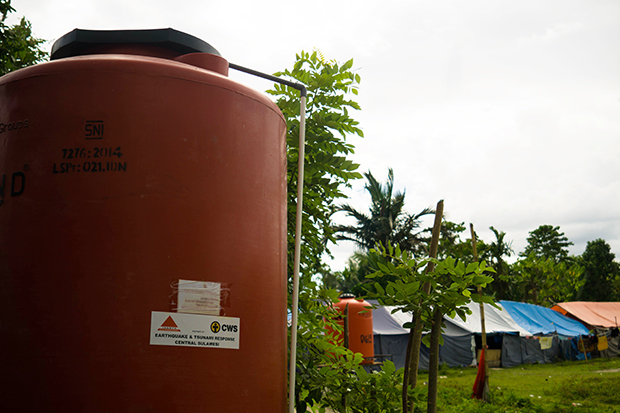
A boy gets water from a CWS truck. He is one of more than 13,000 people who CWS delivers water to each day.
“Water is life.”
It’s a common saying in the humanitarian community, and you’ve probably heard it before. I certainly have. But even after a long career in community development and emergency response organizations, I didn’t really understand what it meant. Not until I visited Central Sulawesi, Indonesia, earlier this month.
Central Sulawesi was hit by an earthquake in September of 2018. That earthquake then triggered a tsunami followed by liquefaction of the earth. This is when saturated soil loses strength and essentially turns to a liquid. Houses, roads and buildings were swallowed up, leaving almost nothing behind.
What I learned was how horrifying it was for the families in Central Sulawesi to be hit by one disaster after another. You survive the first one, and before you can catch your breath another one is striking.
People are just glad to be alive!

There are still flags in the ground in devastated areas, which mark where bodies are buried, waiting to be exhumed.
I remember standing on a sandy field where grass was beginning to grow. I assumed that it was an agricultural field or an empty land before the disasters. Then our local team told me that no, it was not a field. “Do you see those houses over there? Similar houses stood here, including a community hall that could hold over 1,500 people. When the liquefaction happened the earth literally swept over civilization,” they told me. Now it’s like there was never anything here.
When you’re in the situation that families here were in, your only priority is to survive.
But how do you survive when there isn’t clean water? What do you do when your old water sources are no longer an option? Remember, an earthquake happened, then a tsunami struck, followed by liquefaction. These led to saltwater flooding, widespread mud and contaminated water sources. Or water sources just disappeared, buried underground. Imagine houses that have shifted a mile or more from where they were before. Sewage and water pipes that run underground shifted and mixed by such forces during the disasters. You have no other source of water.
But you’re thirsty. The water around you is either dirty, salty or contaminated in some way. Maybe you’ve walked, swam or run a long way. Or maybe you’ve used all your energy trying to help or look for survivors – your family and neighbors. When your only option is dirty water, you drink dirty water. Or you try to catch the raindrops, and then you have mere sips to share with your whole family. If you’ve got food, you can’t cook it without water. Your bathroom needs do not wait even in times of disaster, but bathrooms have been swept away. And where you can use a bathroom, so many people are sharing it and you don’t have a way to clean it. It has become a health hazard.
In these conditions, it’s hard to even feel like a person.

Josephine (center, in CWS vest) with community members in Central Sulawesi, Indonesia. Rev. Vy Nguyen, Executive Director of Week of Compassion, is also pictured (center, in a white shirt).
In the immediate aftermath of the disasters, CWS began trucking clean water to families across the affected areas. As of the end of February, we were using a fleet of about 15 tankers to deliver water to more than 13,000 people every day. That is about four gallons per person per day. Our team understands that people affected by disaster have a right to life with dignity, and safe drinking water is a crucial element in our humanitarian response.
When I asked Maria, one of the survivors, what help has made a big difference, her answer echoed what I heard from people in the other camps. “The day I got clean water!” It was the day when I knew my children wouldn’t get sick, I remember her telling me. The day I could finally bathe – I had mud caked on my body, but I had to think twice before using water to bathe. Now I can be clean. My hair is clean. I put on clean clothes. I can cook. I feel like a person again.

A CWS-provided water tank. Behind it are tents, where survivors who lost their homes are living temporarily.
When you ask people about the CWS water tanks, they are so excited. They all know the number to call to refill the tank to make sure the water does not run out. They may still be living in tents, but they have clean water.
It has been nearly six months since the earthquake and tsunami, and there’s still a long way to go for these families to feel stable again. You can still see the debris structures with flags on them. You wonder what these flags are for, and then you learn that they mark places where people are still buried. Their loved ones hope that they will be exhumed one day. Families are still picking up rubbles. The dry dirt a reminder of the sludge that swept over them.
When I look at the faces of the survivors, I see strength, a spirit of determination and joy that surpasses all understanding. They are so powerful!
Clean water didn’t just make people feel human again. It is life!
To donate to the CWS response in Central Sulawesi, visit cwsglobal.org/sulawesi.
Josephine Oguta is the Vice President, Development and Humanitarian Assistance at CWS.
